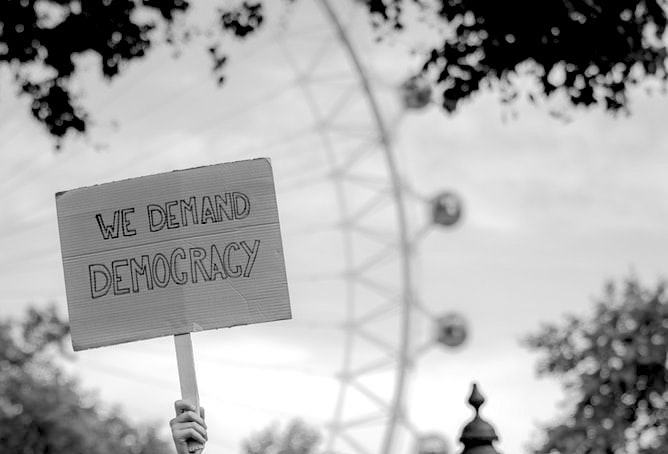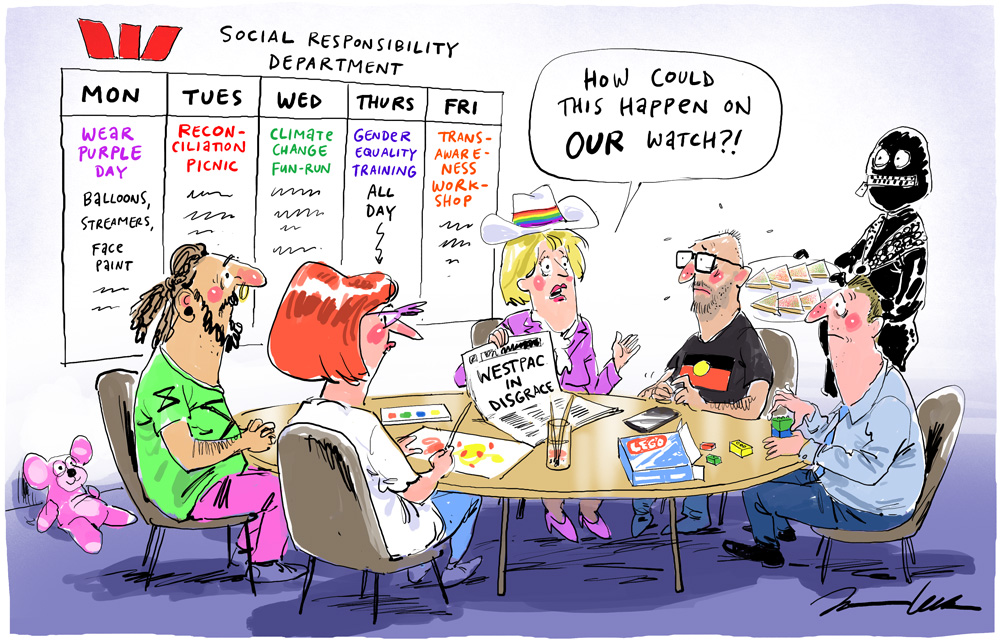By Dieter Zinnbauer
Writing about anything in relation to Covid-19 is rather hopeless. Any attempt to describe current developments has a half-time of 30 minutes. Any attempt to speculate what lies ahead drowns in the flood of near infinite plausible trajectories. And any and every attempt usually ends up with the hammer and nail problem, resulting in the author pushing his favorite pre-existing policy to ask as an essential ingredient in the crisis response, much as the whole world looks like nails when you hold the proverbial hammer in your hand.
Nevertheless here a foolish attempt to jot down some small observations of how the Covid situation is currently influencing how businesses lobby government, or in jargon corporate political activity. In a nutshell: there are indications that there is more, that it is more conventional and that integrity in lobbying is more in demand than ever. In detail:
1) A lot to win and a lot loose means a lot to do or: “Everybody is upside down. All the clients are upside down” (US lobbyist)
Lobbying is typically understood as anti-cyclical as it tends to experience an uptick in economic downturns. Yet this time is a difference in scale and a difference in kind. Covid-19 is an essential threat to a vast array of industries and companies that until a few weeks ago looked very solid. At the same time, the scale of financial support and transformational depth of regulatory responses that are being considered and dispersed are absolutely unprecedented in the post WW2 era.
Existential stakes convert into a sharp increase in lobbying. Recent data shows that lobbying spending in the US has climbed to near-record levels already and the centrepiece of legislation, the Coronavirus Aid, Relief and Economic Security Act is the second most lobbied upon a piece of legislation.
There are new clients – that also fuel the lobbying boom – three quarters of lobbying filings in the US that mention COVID issues are by new principals. And there is a flourishing new service line out there helping companies shape new rule-writing and expedite approval for their anti-corona products. Many are desperate, everyone is out to get a piece of the cake and as even the most adept watchdogs have a hard time with tracking all proposed rule-changes and handouts it may also be a good time to slip in this long-coveted, yet unrelated regulatory tweak in one’s own favour that otherwise might have not withstood public scrutiny.
2) Forward to the basics tools, tactics and incumbents.
It seems likely and there are indications that corporate political activity is for the time being concentrating on tried and tested tools and relations. First, the Covid-19 response is the hour of the executive as the first phases of the policy response are firmly driven by the executive in most countries around the world. Emergency powers are being invoked, far-reaching policies are hastily cobbled together in small committee, and implemented qua executive orders. Ex-ante legislative deliberation is compressed, public consultations are limited and judicial reviews are only slowly kicking into gear. All this means that lobbying is currently heavily focused pragmatically on very tangible outcomes and the executive branch of government as for example, a top German lobbyist has described in a recent interview.
Expected budget cuts and trimmed client accounts for public relation agencies in the first-affected Asia-Pacific also suggest that more sophisticated upstream strategies for framing and influencing public debates in the longer run are being put on the backburner and efforts are shifting towards core government relations work. Add to this that social distancing measures and going virtual makes it difficult to cultivate new relationships. As a result, existing, networks and long-time friends who may have walked through the revolving door between public office and private practice carry the day dealing substantive incumbency advantages to the already well-connected and established players both in terms of in-house lobbying departments and hired firms.
3) An incipient debate about the fundamentals close to home – and high stakes for integrity
Financial distress and zero-sum dynamics in what are ultimately finite support programs demand maximum resolve when making one’s case to the government. Many more interests than usually have come to the fore to compete for the pie and some of these competitors can be expected to act very opportunistically. All this puts enormous stress on integrity in lobbying. But this comes at a time when the integrity of the corporate political activity is perhaps more important than ever.
Policy-makers enter into uncharted territory with many of their interventions and stabilization efforts. Peak uncertainty means they need accurate information on the situation of different interests and stakeholder groups and how they may be affected by different policy options. Policy-makers need more of this information more urgently than ever. Extreme fragility means that the consequences of mis-judgments are substantive.
All this highlights how important the honest, proportionate, evidence-supported articulation of interests and concerns to government is at this moment in time. In the eye of the public business appears to be largely failing in this area. Less than 40% of respondents in a very recent 11-country survey – the spring update to the 2020 Edelman Trust Barometer – perceived business to be a reliable source of useful and accurate information during the pandemic, a number that dropped to even more staggering lows of 24% and 15% in France and Japan respectively.
Yet, the relevance of credibly upholding integrity in lobbying goes even deeper. The specter of special interests hijacking the Covid response looms large as a tremendous PR nightmare. Such a storyline is ready to combine with the bitter aftertaste of the last financial crisis response that many perceived to be undermined by strong industry lobbying. The prospects of a special deal for special interests could thus further inflame the very anti-business sentiments that are already on the rise: in the same survey as referenced above respondents put business CEOs last when thinking which types of professions and leaders do a good job in meeting the demands the pandemic puts on them, while only 38% thought business did a good job in putting people before profits.
Pushing public opinion that is already at the edge further into the negative territory through reckless corporate political activity looks like a bad idea even from a narrow tactical perspective. This is because another fallout from Covid is an emerging public debate about the basic bargain between business and the public and the increasing readiness to consider options for a fairer settlement that until recently seemed to have difficult to find acceptance in the mainstream.
The 11-country Edelman survey again captures some of these sentiments: a remarkable 64% of people agreed with this statement:
“This pandemic has made me realize how big the gap in this country is between the rich and the working class, and that something must be done to more fairly distribute our country’s wealth and prosperity”
Massive public financial support is a great lever for updating the social licence to operate for the corporate world. This is not a theoretical possibility but has already become a reality. Widely discussed provisions to bar companies that engage in overly aggressive tax planning or pay out dividends in times of crisis from benefiting from post-Covid support is one example. So is the observation that a debate about the legitimacy of share buy-backs that despite its policy relevance was more or less confined to the fringe of experts and specialized advocates all of a sudden features prominently in the policy mainstream. It has even prompted the European Commission to require a ban on share buybacks as a central condition when government prop up companies by acquiring equity ownership.
This public limelight for a seemingly arcane issue is well deserved considering that for example the top airlines in the US that are currently clamoring for public support are estimated to have spent 96% of their free cash flow during the last decade on share buybacks and built no meaningful reserves to weather a major crisis, a strategy termed by a banker from a top firm as “a staple arrow in the quiver of companies… to optimize how they drive the most value for their shareholders”. From a corporate lobbying view not particularly productive narratives to feed any more.
Many, including this author, view this as a much needed and welcome conversation about how to refresh the principal compact between business and society in view of sharing the benefits and costs from business activity fairly and within planetary boundaries. Business will not do itself a favor when flexing its lobbying muscle too hard for special treatment at this point in time when the public is increasingly prepared to doubt and revisit the basic tenets of this compact.
Responsible corporate activity, transparent, well-governed and aligned with purpose, planetary boundaries and broader regards for all stakeholders is not a nice add on for good times. It is essential to protect the public trust in functioning institutions, functioning crisis response and a functioning societal bargain with business. This is not the time to call in special favours and push a narrow agenda. This is the time to do act as a responsible corporate citizen on all fronts and particularly when it comes to government engagement.
Now there it is: my policy agenda framed as essential in Covid times. The whole world looks like nails when you have a hammer in the hand. But in this instance, of course, it is for real.
About the author
Dieter Zinnbauer is a Marie-Skłodowska-Curie Fellow at CBS’ Department of Management, Society and Communication. His CBS research focuses on business as political actor in the context of big data, populism and “corporate purpose fatigue”.
Twitter: @Dzinnbauer
Essays: https://medium.com/@Dzinnbauer
Working papers: https://papers.ssrn.com/sol3/cf_dev/AbsByAuth.cfm?per_id=1588618
More about coronavirus pandemic on Business of Society blog:
The Coronavirus Pandemic – and the Consequentiality of Metaphors
Sustainable Development, Interrupted?
The Political Economy of the Olympics – Misconceptions about Sustainability
Supply Chain Responsibilities in a Global Pandemic
A Green and Fair COVID-19 Recovery Plan
In Movement from Tanzania to Northern Italy to Denmark
How to make food systems more resilient: Try Behavioural Food Policies
Photo by Dieter Zinnbauer










